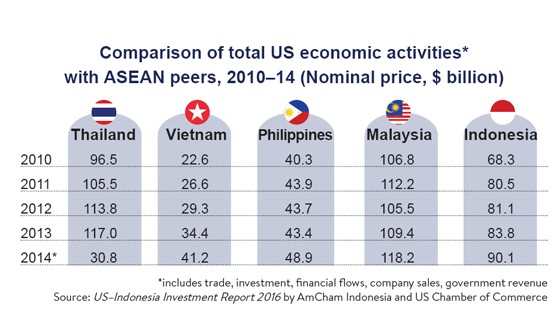Popular Reads
Top Results
Can't find what you're looking for?
View all search resultsPopular Reads
Top Results
Can't find what you're looking for?
View all search resultsUS, Indonesia economic ties set to strengthen
Change text size
Gift Premium Articles
to Anyone
 American Chamber of Commerce (AmCham) Indonesia president Brian Arnold (left) officially hands over the executive summary of the US-Indonesia Investment Report to Investment Coordinating Board (BKPM) chairman Thomas Lembong (center) while executive vice president and head of international affairs US Chamber of Commerce Myron Brilliant (right) looks on, during the US-Indonesia Investment Initiative 2016 in Jakarta on Thursday. (JP/Dhoni Setiawan)
American Chamber of Commerce (AmCham) Indonesia president Brian Arnold (left) officially hands over the executive summary of the US-Indonesia Investment Report to Investment Coordinating Board (BKPM) chairman Thomas Lembong (center) while executive vice president and head of international affairs US Chamber of Commerce Myron Brilliant (right) looks on, during the US-Indonesia Investment Initiative 2016 in Jakarta on Thursday. (JP/Dhoni Setiawan)
T
he US is pinning high hopes on economic ties between it and Indonesia growing exponentially, as the world’s largest economy sees a future in creative industries, the financial sector and infrastructure.
The total value of economic relationship between Indonesia and the US could reach US$131.7 billion in 2019, a 46 percent increase from $90.1 billion in 2014, according to the “US-Indonesia Investment Report 2016” released by the US Chamber of Commerce and American Chamber of Commerce (AmCham) Indonesia.
Economic relationship does not only cover trade and investment, but also financial flows, company sales and government revenues.
The prediction was made with a best-case scenario assumption that President Joko “Jokowi” Widodo achieves his goal of a staggering 7 percent economic growth by the end of his term, from 4.79 percent last year, the lowest in six years.
The target is possible, said US Chamber of Commerce executive vice president and head of international affairs Myron Brilliant, provided the government has the right policy mix, including transparency and a more relaxed negative investment list (DNI).
“There have been some important steps in the right direction in this relationship. This is the kind of thing that sends a positive message to the investment community,” Brilliant said in his speech at the annual US-Indonesia Investment Summit on Thursday.
The US has acknowledged that the government, for example, opened up total foreign investment for 35 sectors in February this year, including the e-commerce sector, which is expected to be a future growth sector for US investment in Indonesia.
It has also rolled out over a dozen economic policy packages, addressing various problems, including cutting bureaucratic red tape and decreased the number of permits required to do business in Indonesia.
The moves might have borne fruit. A survey conducted by AmCham Indonesia this year with US companies operating in Indonesia this year showed that more than 80 percent of the companies felt that there had been some improvement in the investment climate over the past two years.
As a result, the participating companies said they would invest more than $334 million over the next five years. Nine potential areas identified are: creative industries, finance, infrastructure, oil and gas, consumer goods, agriculture, extractives, pharmaceuticals and information and communications technology.
Coordinating Economic Minister Darmin Nasution said that although the country’s foreign direct investment (FDI) stood at $893.2 million in 2015, lower than $1.3 billion in 2014, their was a lot of untapped investment potential. The US is Indonesia’s seventh-largest foreign investor.
“The US will continue to remain one of Indonesia’s most important economic partners in the years to come,” said Darmin, citing the $20.25 billion in deals committed by US businesses during Jokowi’s visit to Washington late last year.
 (-/-)
(-/-)
At the moment, Indonesia’s economic relations with the US trail behind that of other Southeast Asian nations. Last year, Thailand and Malaysia respectively posted $137 billion and $121.1 billion economic relationships with the Western superpower.
AmCham Indonesia and the US Chamber of Commerce also said that one big challenge that could hamper Indonesia achieving its full potential was the fact that the thinking of many bureaucrats had been inward looking, posing a threat to the country’s openness.
“While some senior technocrats make the case for greater participation in the global economy — an idea backed by President Widodo with orders to streamline regulations — the reality is that many career bureaucrats have been resisting the directives as they continue to pursue regulatory complexity,” reads the report.
Indonesia so far ranks 109th out of 189 countries in the World Bank’s 2016 Ease of Doing Business report, beaten by Malaysia at 18th, Thailand at 49th and Vietnam at 90th.
Some of the ideas proposed by the US to make Indonesia reach its full potential are: abolish the DNI, bureaucratic reform, regulator- or government-and-business collaboration instead of distant monitoring and freedom to establish foreign legal entities (PMAs) via an online application with the Law and Human Rights Ministry instead of a lengthy bureaucratic process.
As if giving a green light to US businesses, Indonesian Chamber of Commerce and Industry (Kadin) chairman Rosan P. Roeslani said that Indonesia was “pragmatic”.
“We know that we need FDI to grow our economy. We can’t be too protectionist. We have to help our businesses succeed,” he said.









